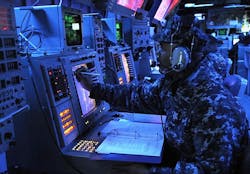Navy looks to Global Technical Systems for shipboard thermal management in embedded computing
Officials of the Naval Air Warfare Center Aircraft Division in Lakehurst, N.J., announced an $11.9 million order to Global Technical Systems last week to develop and deploy an efficient cooling system for Navy shipboard computers.
This order involves the third phase of the Navy's Improved, Flexible Infrastructure Compatible, Open-Loop Air-Cooled Computer Rack and Cabinet project, which seeks to eliminate standard computer cooling fans by bringing in cooled air from the ship's heating, ventilation, and air conditioning (HVAC) systems and exhausting hot air from the top of the computer racks near air returns.
Global Technical Systems experts will help the Navy install and evaluate a new air conditioning and electronics thermal-management system appropriate for naval vessels.
If tests are promising, this computer thermal management system first may be installed aboard the America-class amphibious assault ship USS Bougainville (LHA-8), which will be built at the Huntington Ingalls Industries shipyard in Pascagoula, Miss., and delivered to the Navy in 2024.
Related: GTS to provide air- and water-cooled shipboard computers for Navy cruisers and destroyers
Experts are exploring outfitting spaces aboard the Bougainville with electronics cooling systems mounted to the deck, bulkheads, and in the overhead.
Typical shipboard computer racks and cabinets operate in small spaces and generate a large amount of heat, Navy officials explain. Instead, they want more efficient computer cooling that is compatible with shipboard HVAC systems.
Today's standard computer racks and cabinets use side- and back-mounted fans and require a duct connected to the ship's HVAC system to remove heat from shipboard computer rooms. Global Technical Systems has developed more efficient cooling for individual computer racks and cabinets using below-deck HVAC system supply air.
In the project's first and second phases, Global Technical Systems developed a prototype air-cooled computer rack system, and established its feasibility with component testing and analytical modeling. Now the company will refine this prototype for realistic shipboard testing.
Related: Navy interested in new computing and sensor technologies for shipboard and submarine sonar
Not only will this system cool individual computer racks with shipboard air-conditioning, but it also will control the supply of cool air to compensate for varying cooling demands. The system prototype will maintain existing computer rack size, shape, weight; maintain current shock-mount effectiveness; and demonstrate reliability and performance that is better than current shipboard computer thermal management approaches.
This approach could reduce the need for new computer rack foundations and HVAC ducting, and help the Navy reconfigure on-board electronics and computer spaces as system updates and changes occur. It could help eliminate large amounts of HVAC ducting; reduce the need to rebalance the HVAC system; reduce costs, Navy officials say.
On this order Global Technical Systems will do the work in St. Petersburg, Fla.; Brentwood, Calif.; and Virginia Beach, Va., and should be finished by August 2020.
For more information contact Global Technical Systems online at http://gts.us.com, or the Naval Air Warfare Center Aircraft Division-Lakehurst at www.navair.navy.mil.
Learn more: search the Aerospace & Defense Buyer's Guide for companies, new products, press releases, and videos
